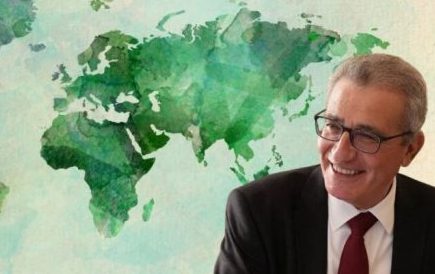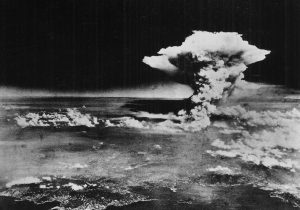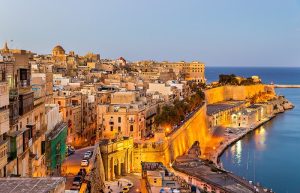Security Alliances, Humanitarian Consequences
Implications on Stability and Development (On International Organizations and Security Alliances)
Amman (Jordan) – November 07-09, 2023
I come from Malta, the smallest state in the European Union (316sqkm, population 516,000). We are the only neutral EU member state in the Mediterranean.
In the book just published: ‘The success of small states in international relations – mice that roar?’ Godfrey Baldacchino reproposing the small state, concludes: “… in the world today there are many states, among which there are a few large states … Small players are made to think and believe that they are anomalies, quirks in the international system, when actually they are the norm, and it is the large countries that are the outliers.”
Small states should not accept the imposed inferiority, miniaturization, boundaries and limitations that others set for them.
Small states make life more difficult for themselves when they have national political elites who have an inferiority complex and are culturally dependent, “their minds stuffed with foreign values and theories … “. From his direct practical experience of former colonies Dudley Seers, the British/New Zealand development economist, observed “that the capacity of a government to adopt an independent strategy might lie not so much in its productive structure, technology, natural resources or military capability, important though these were, as in the strength and homogeneity of its culture which can help it and its leadership avoid cultural dependence” on an imported way of perceiving the nation’s own needs.”
James Jay Carafano of the Heritage Foundation, says: “Little nations are not sand to be ground between the great wheels of major powers. They are made up of people, not pawns. Citizens in small states have the same hopes, aspirations and natural rights as those in world powers. These people have every reason to expect and demand a life of freedom, peace and prosperity.”
He thinks that America should “Avoid Us-or-Them-ism…. America can’t ask countries not to do business with China. After all, the United States does business with China. The goal is not to get countries to take sides but to engage and help them act consistently with their own interests …”
More nations are pursuing their own paths and seek to control their own destiny, even by freely forming blocs in an increasingly multipolar world facing unprecedented global challenges.
Small states can offer important answers to large questions. Ban Ki Moon told the Forum of Small States in 2012: “Being small does not mean an absence of big ideas.” Kofi Annan told Barbados in 2002: “What happens in your nations is of great concern to the rest of the world. Your countries are places where, in concentrated form, many of the main problems of development and environment are unfolding. Your experiences, your experiments, your transformation — can guide the way to a brighter future for all peoples.”
Small island states are playing a crucial role on the existential issue of climate change like they did on the UN Convention of the Law of the Sea. The Arms Trade Treaty and the establishment of an International Criminal Court are among the achievements of small states. It is the major powers who believe that might is right when it suits them.
Global order not working
The new and old conflicts and the arms races in different regions show that the ideal global conditions for small states – a peaceful and equal order governed by international cooperation – is still a very distant dream. Barbados PM Mia Mottley calls for a truly inclusive UN whose security council does not have the power of veto and for a change in the main financial and trade global organizations that to this day continue to reflect an imperialistic order. “The global order is not working; it is not delivering in the areas of critical importance necessary to achieve the goal of sustainable development for the majority of the world’s population.” In their own interests, small states need to work with those countries that want to create a new world order that works for them.
The wars in the Ukraine and Gaza are moving further apart the Global North and Global South. The US and most of the leaders in the EU want the countries of the Global South to side with the West against Russia and to side with Israel on the terms dictated by the West.
Such people in the West show that they still have an old colonial mentality. There is no serious attempt on their part to practise any respect, humility and mutual understanding to see the world from non-Western eyes.
If the US and the EU make no serious effort at some soul searching and simply dismiss with contempt non-Western countries that do not do their bidding, instead of mobilising the Rest of the world against Russia and in favour of Israel, they will end up polarising the people – if not the elites – of the rest of the world against the West.
Although Malta is in the EU it is one of those member states that have been colonized and so we can understand the perspective of the countries in the Global South.
These countries know their history. They lived and suffered greatly through Western colonialism and are still feeling its devastating effects in many ways. They lived through the Cold War. Governments and leaders in the Global South, including the Middle East and the Gulf, who wanted to liberate their countries and nationalise their resources for the benefit of their people were removed often violently and without any regards to sovereignty. Support for the South African Apartheid regime and military dictators was justified as indispensable to prevent the spread of Soviet backed communism on the African continent and beyond.
In his article ‘How (not) to persuade Africa to support Ukraine and denounce Russia’ (The African Report, 25 April 2022), Nic Cheeseman argues that African countries know that during colonialism and the Cold War the West was willing to sacrifice democracy and human rights on the altar of national security: “that helps to explain why many African states do not want to get sucked into the current confrontation. History has taught them that becoming pawns in an international conflict they cannot control generates few benefits and massive risks.”
He refers to Muthoni Wanyeki’s observation that “the idea of being “non-aligned” is not new, unprincipled, or limited to African states… Moreover today, as in the past, “nonalignment may be a sensible strategy for individual countries as a way to preserve autonomy and avoid costly choices between major powers.”
Cheeseman goes on to say: “The majority of African leaders and people stand against imperialism and war and have no love of Putin … despite the fact that Russia provides aid and military support to a number of states … a majority actually supported the West’s position, while others sought to sit on the fence rather than actively support Putin.”
He concludes; “… simplistic arguments that are highly critical of African governments without attempting to view recent events from their perspective risk polarising the debate in a way that will only alienate potential allies, the vast majority of whom hold pro-democratic and anti-war attitudes.”
Is the West ready to listen?
The same applies for the stand taken by the West in Israel’s war on the people of Gaza, punishing them collectively in response to the terrorist attacks of Hamas. The West is losing more credibility and prestige by showing double standards and hypocrisy by condoning the breach of international law in Gaza by Israel while condemning Russia for war crimes in Ukraine. Over the last 75 years the West has allowed Israel to continue expanding its territory at the expense of the Palestinians, turning the two state solution into a cruel joke and scattering six million Palestinians in 56 different refugee camps in different countries.
The West must listen to the countries of the Global South with humility and empathy if it does not want to alienate them totally.
Resetting the relationship between the West and the Rest we must confront the demons of the past, the past of the slave trade and colonialism. Is the West ready to reset the relationship between it and the Global South and move away from the continuation of colonialism by other means. Many in the West still have to learn how to talk, think about and behave differently towards the Global South without any feelings of superiority.
158 out of 193 states in the world are either neutral or non-aligned or both and do not belong to any military alliance involved in great power conflicts.
In its Constitution Malta declares itself to be both neutral and non-aligned, “actively pursuing peace, security and social progress among all nations by adhering to a policy of non-alignment and refusing to participate in any military alliance.” This means that “no foreign military base will be permitted on Maltese territory” and that “no military facilities in Malta will be allowed to be used by any foreign forces.”
In the case of the Russian invasion of Ukraine, we have made it clear that our military neutrality does not stop us from taking sides when it comes to upholding the principles of sovereignty, independence, territorial integrity and the peaceful resolution of disputes. But it stops us from participating militarily.
In the last 19 years, Malta has declined from participating in the EU’s military operations. When the EU used the framework of the European Peace Facility to vote to send weapons to Ukraine to defend itself against the Russian invasion, Malta did not veto the decision, which requires a consensus. But nor did it send any lethal weapons and instead sent humanitarian aid.
We must not simply imitate what other countries do. We have to think autonomously and keep our geopolitical reality in mind and how best to look after our own prosperity and values in an increasingly polarised world where we need to get on with as many different countries as possible. We are at the centre of the Mediterranean Sea that touches the continents of Europe, Africa and Asia. We need to stay on good terms with all three of them.
Many other states of the Global South also want to have good relations with many different countries in the world without having to take sides in conflicts among them.




